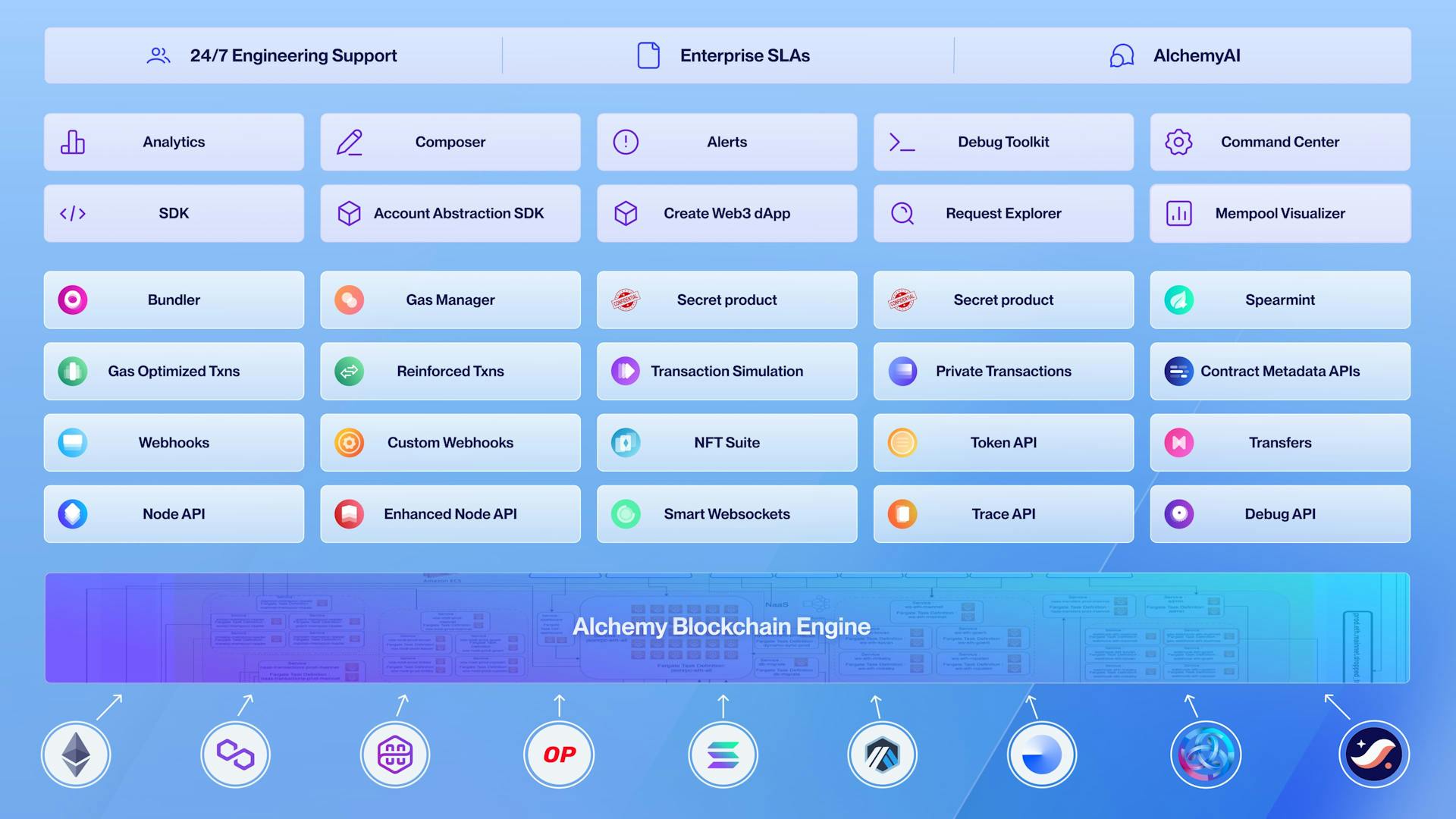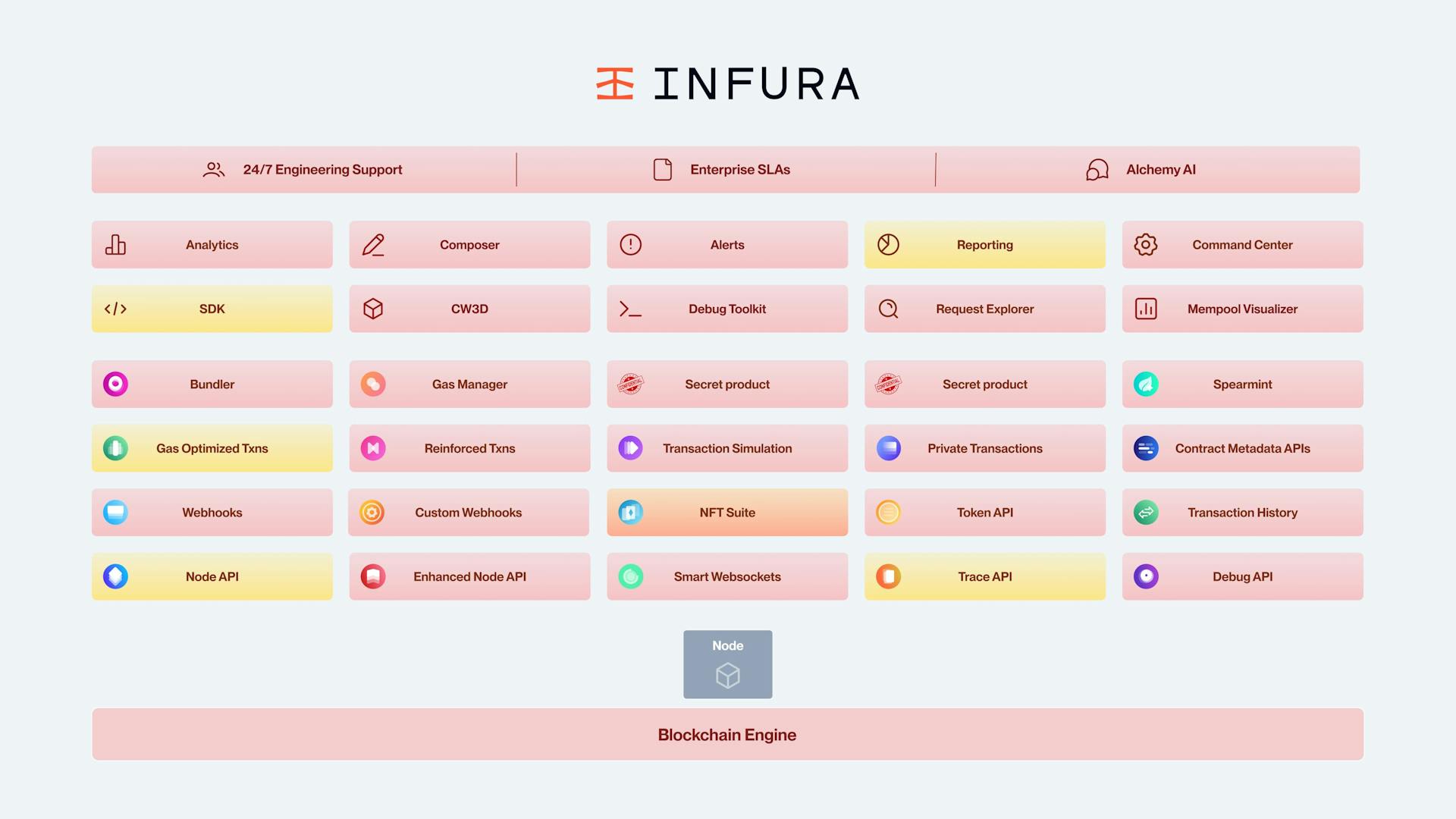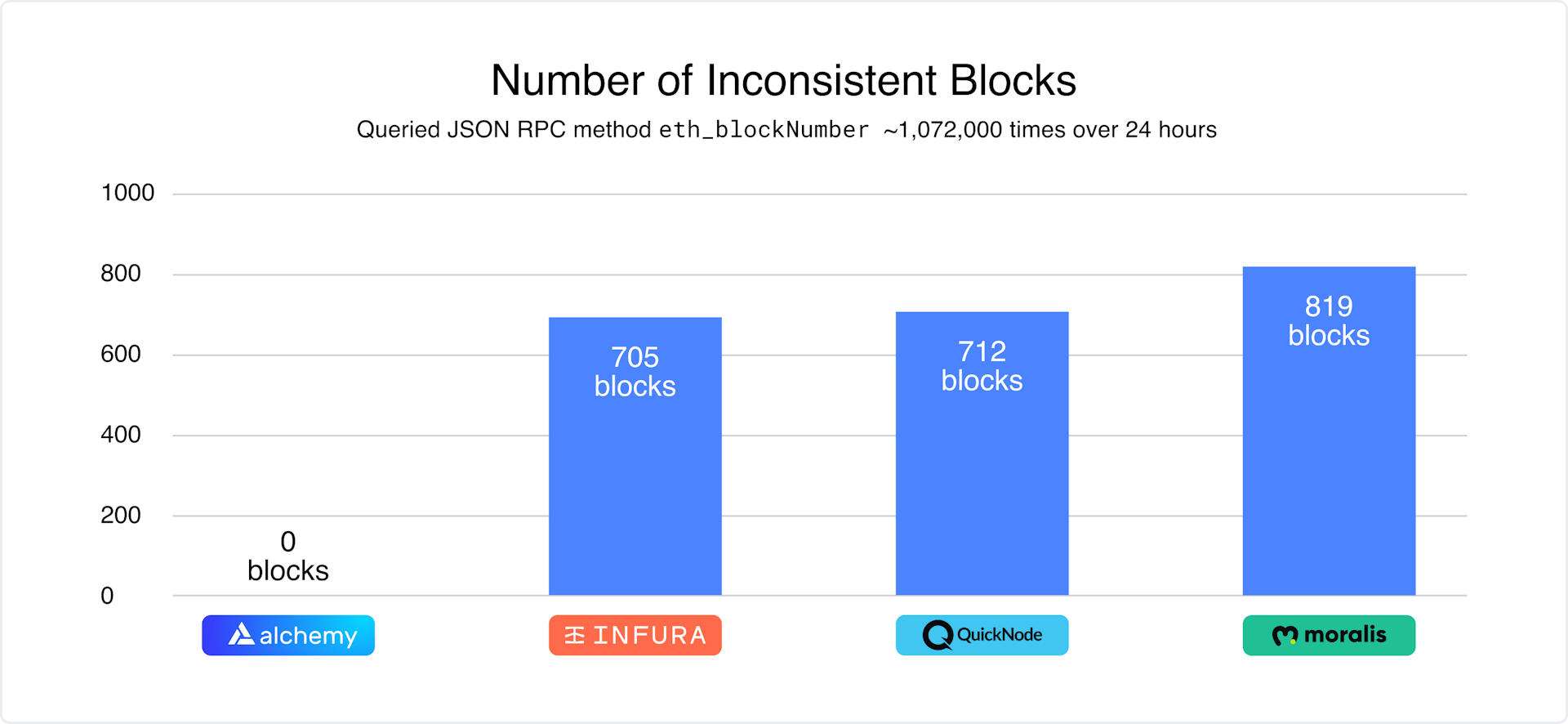
Alchemy vs. Infura - Blockchain Node Provider Comparison
Written by Frederik B
Alchemy's blockchain development platform provides RPC nodes with more accurate and reliable blockchain data, and more web3 tools and APIs compared to Infura.
Alchemy and Infura are two popular blockchain node providers that offer access to critical blockchain infrastructure as a service. Self-hosting nodes is expensive due to the rising costs of cloud hosting, the cost of dedicated engineering resources to maintain them, and the lost opportunity costs when a node goes down due to CPU spikes, memory leaks, disk issues, bugs, and more.
In this article, we'll help you decide which node provider is right for your needs by comparing Alchemy and Infura across nine categories:
Supported Blockchains
Node Latency
Data Accuracy
Node Reliability
Pricing
Enhanced APIs
Developer Tools
User Experience
Customer Support
Alchemy vs. Infura Comparison
Alchemy and Infura are two blockchain node providers that help web3 startups build dapps without running their own nodes.
Choosing the right blockchain node provider is a crucial step in the web3 development process, as you want to use a developer platform that offers the most cost-effective requests, the best tools, reliable service, accurate data, and the ability to scale on demand to grow with your project.
What is Alchemy?
Alchemy provides blockchain APIs and node infrastructure, supporting over 10 million end users and powering some of the world's top blockchain apps, including OpenSea, Trust Wallet, and 0x, and the largest web2 companies, such as Shopify and Adobe.
Alchemy offers a suite of developer tools to help developers build, debug, and ship products faster and monitor dashboards to track errors, user insights, and trends.
Alchemy is one of the biggest venture-backed startups in web3 with investors including Pantera, Coatue, A16z, Redpoint, Lightspeed, Coinbase, and some of the most accomplished individuals in tech, including Naval Ravikant, Peter Thiel, and Reid Hoffman.
Alchemy Supernode is the infrastructure engine that powers some of the world's top blockchain apps. It offers a one-line infrastructure API that does all the jobs of a single node and comes with the uptime, availability, and necessities to run a production application. The architecture uses dedicated distributed systems to power each node functionality and maintains real-time data correctness with a proprietary coordinator service.

What is Infura?
Infura is another popular blockchain node provider offering APIs and developer tools for building on web3, focusing on Ethereum, Ethereum Layer 2s, Polygon, and IPFS.
Infura is owned by ConsenSys, a software development company founded by Joe Lubin, an original co-founder of Ethereum. ConsenSys also owns projects such as MetaMask, an Ethereum wallet, and Truffle, a blockchain development environment.
Infura uses a cloud architecture model, including syncing directly from object storage, a parity backend that runs in AWS Elastic Container Service (ECS), and a "Source of Truth" node that creates a snapshot of chain data and pushes it to an S3 bucket.

Next, we'll dive in deep on 9 key factors to consider when evaluating Alchemy and Inufra.
1. Supported Blockchains
When searching for a new node provider, companies should consider the networks supported by providers to ensure that they support their current app, the chains they want to expand to immediately, and the chains on the provider's roadmap.
Alchemy supports the following 8 blockchain networks:
Ethereum
Optimism
Arbitrum
Polygon PoS
Starknet
Solana
Polygon zkEVM
Base
Astar (Polkadot)
Alchemy supports the following testnets:
Goerli (Ethereum, Optimism, Arbitrum)
Sepolia (Ethereum)
Mumbai (Polygon)
Infura supports the following additional blockchains::
Avalanche
Aurora
NEAR
Palm
Celo
Linea
Alchemy and Infura both support multiple blockchains. Choosing one option versus the other should depend on whether either of them supports your primary and secondary expansion chains.
For example, Alchemy would be a good choice if you're looking for a Solana RPC provider, whereas Infura would be better if you want to build a dapp on Avalanche.
2. Node Latency
There are two kinds of blockchains latency. Block discovery latency is the amount of time a node provider uses to discover a new block, and request latency is the time difference between sending a blockchain request and receiving a response.
Alchemy engineers recently conducted a side-by-side comparison of Alchemy and Infura to measure request latency.
In this test, we queried eth_blockNumber and measured the time between the origination of the request and the receipt of the response on the Ethereum mainnet. We then aggregated and averaged this number across approximately 250 total queries, each at 15-minute intervals for Alchemy and Infura.
In our most recent test, August 12th, 2022 - August 15th, 2022, Alchemy averaged 39.96 ms, and Infura averaged 38.18 ms for the US East location.
While Infura's request latency is 4% faster than Alchemy's in this test, Alchemy's secondary infrastructure, such as synchronizing 30% of Ethereum nodes before confirming a block, offers web3 developers higher guarantees for data accuracy, node reliability, and scalability.
3. Data Accuracy
It is essential for node providers to provide users and dapps with accurate blockchain data, as incorrect information can negatively impact the web3 user experience:
Requests return different answers to the same question
Dapps retrieve incorrect transaction nonces
Users have a poor experience when tokens and NFTs appear incorrectly
In a recent data accuracy benchmarking experiment, we queried eth_blocknumber on the Ethereum mainnet over 1 million times in 24 hours and found that Infura returned 705 inaccurate block numbers, while Alchemy returned 0 inaccuracies.

Alchemy Supernode allows Alchemy's API to act as a single node, enabling 100% accuracy. This is achieved with an explicit consistency layer called Vox Nodi, a consensus algorithm that allows each node to vote on the data it receives, and the data is only returned to the user when it is accurate.
While Infura has 4% lower request latency than Alchemy, returning blockchain information faster at the expense of data accuracy can lead to a degraded web3 user experience.
4. Node Reliability
Node reliability is a measure of uptime, and it is an important category to compare when choosing a node provider because it directly impacts a dapp's ability to serve customers at any time of the day.
Alchemy and Infura both have highly reliable systems. However, when examining historical uptimes on each node provider's status page, we find that, on average, Alchemy's systems have better uptime.
The node reliability status page shows the following comparisons for the Ethereum Mainnet from January 2022 to July 2022.
January - Alchemy (100%) vs. Infura (100%)
February - Alchemy (100%) vs. Infura (99.98%)
March - Alchemy (100%) vs. Infura (99.97%)
April - Alchemy (99.97%) vs. Infura (99.91%)
May - Alchemy (100%) vs. Infura (100%)
June - Alchemy (100%) vs. Infura (100%)
July - Alchemy (99.92%) vs. Infura (99.99%)
In addition to overall uptime, there have been historical outages on Infura that have rendered many dapps including MetaMask wallets unusable, even though the main Ethereum network was operational.

In November 2020, Infura experienced a 7-hour outage that impacted millions of users due to a bug that affected their nodes running geth v1.9.9 and v1.9.13, two outdated versions of the geth node client. As recently as April 2022, Infura experienced a 3-hour outage due to an internal configuration change.
5. Pricing
Compared to Infura, Alchemy provides approximately 400% more free requests per month than Infura's free tier, does not cap Archive node access, and doesn't require users to add a credit card on file to access Layer 2s, and sidechains like Optimism, Polygon, and Arbitrum.
Alchemy and Infura both have four main pricing tiers: Free, Growth, Scale, and Enterprise. Here are the main pricing tiers for each company and a few key features:
Alchemy Pricing
Alchemy Free Tier ($0/month)
300 million compute units (CUs)/month
330 compute units per second (CUPS)
All developer tools
Enhanced APIs and SDK
Full archive data
Multichain mainnets and testnets
No daily request limits
5 apps
24/7 Discord Support
Alchemy Growth Tier ($49/month)
In addition to everything included in Alchemy's free version, growth tier customers receive:
400 million compute units (CUs)/month
Auto-scaling compute units at $1.2 per 1 million additional CUs
Parity Trace and gETH debug
Enhanced transaction propagation
2x higher throughput (660 CUPS)
15 apps
24/7 dedicated Discord support
Alchemy Scale Tier ($199/month billed annually)
For teams with big goals who want to move quickly, the new Scale tier provides Alchemy's best products and prices at the click of a button.
1.5 billion compute units (CUs)/month
3,000 compute units per second
Auto-scaling compute units at $1 per 1 million additional CUs.
Ability to purchase discounted additional CUs at $0.7 per 1 million on the annual plan.
30 apps
24/7 dedicated Discord support
Alchemy Enterprise Tier (Custom)
Committed use discounts
Custom SLAs
Pay with crypto
Custom throughput
Unlimited apps
24/7 VIP support
Infura Pricing
Infura has four main pricing plans: Free, Developer, Team, and Growth.
Free ($0/month)
Requests: 100,000 Requests/Day
Number of Apps: 5
Features: Ethereum Mainnet and Testnets, Community Support Forum, and other basic features
Developer ($50/month)
Requests: 200,000 Requests/Day
Number of Apps: 10
Features: Everything in the Core plan plus Direct Customer Support, Archive Data (additional $250 per Month)
Team ($225/month)
Requests: 1,000,000 Requests/Day
Features: Everything in the Developer plan plus 24hr Support Response Time
Growth ($1000/month)
Requests: 5,000,000 Requests/Day
Features: Everything in the Team plan plus 8hr Support Response Time
Interestingly, builders who choose to provide their credit card information to Alchemy will receive an additional 1,000,000 compute units per month on the free tier.
6. Enhanced APIs
Besides node services, Alchemy and Infura provide additional developer tools and expanded API functionality to enable developers to build better technology with Token APIs, Trace APIs, WebSockets, and more. This section will review a few of the most important APIs and developer tools offered by Alchemy and Infura.
Alchemy's Enhanced APIs
NFT API
Web3 SDK
Trace API
Notify API (Webhooks)
Subscription API (Websockets)
Flashbots API (send private transactions)
Token API
Transfers API
Transaction Receipts API
Gas Manager API
Bundler API
Alchemy vs. Infura NFT API Comparison
One expanded API offered by both Alchemy and Infura is an NFT API that gives developers access to new API endpoints for getting NFT data from the blockchain. Both NFT APIs offer helpful endpoints including:
getNFTs
isHolderOfCollection
getNFTsForCollection
getContractMetadata
getNFTSales
Alchemy's NFT API takes it to the next level and currently supports the following additional NFT API endpoints not supported by Infura:
getOwnersForCollection
getNFTMetadata
getOwnersForToken
getOwnersForCollection
getSpamContracts
isSpamContracts
reingestContract
getFloorPrice
computeRarity
summarizeNFTAttributes
reportSpam
It should be noted that Infura's NFT API is being deprecated on November 1, 2023 and will no longer be usable at that point. Infura's website recommends switching to a new provider, such as Alchemy!
Web3 SDK
Alchemy SDK is a drop-in replacement for Ethers.js that makes it simpler to build dapps and has been battle-tested in production by leading wallets and applications. It offers many advantages over ethers.js, including resilient event delivery and lowered failure rate.
Alchemy's Account Abstraction SDK
The Account Abstraction SDK can be used to simplify the interaction with account abstraction primitives (user operations and bundlers).
It's a complete solution that implements an EIP-1193 provider, handling gas estimation, signing the tx, and fetching paymaster data (if you use one) with one method call. If you're using eth_sendTransaction, the SDK converts that into a user operation for you and sends it along.
7. Developer Tools
Alchemy offers several developer tools to help developers build, debug, and ship products faster. These include:
Alchemy AI - generate web3 code quickly to supercharge your development cycle
Explorer - see historical request information to quickly identify patterns
Mempool Visualizer - monitor the current status of confirmed, stuck, and dropped transactions
Composer - troubleshoot RPC requests, replay failed transactions for easier debugging
Debug Toolkit - scan recent requests and quickly detect errors while debugging
Dashboard - get high-level analytics on your dapp performance
Usage Analytics - get dapp’s usage over different timeframes, app versions, and individual methods.
Command Center - get high-level app health, requests per second, response times, and error rates
User Insights - get geographic usage, traffic, and activity data, all without compromising user privacy or data security
Alerts & Digests - get automated alerts of error points, and a daily digest reporting all key health metrics of your dapp
Faucets - Alchemy provides multiple testnet faucets, including Sepolia faucet and Mumbai faucet
Infura offers developers an IPFS API and a transactions tool, ITX, to help transactions get included in a block by proactively updating transactions with competitive gas prices in case they are at risk of being dropped from the mempool.
8. User Experience
Alchemy aims to make it easy for developers to build in web3. The company offers several features to help improve the user experience, including a one-line infrastructure API, enhanced APIs, developer tools, and more.
Infura also focuses on providing a good user experience for developers. The company offers scalable systems, key NFT metadata, tools, and templates to help developers deliver a better user experience. Infura's multichain ecosystem also allows developers to choose a network that meets their requirements.
9. Customer Support
Alchemy and Infura offer user documentation, a 24/7 Discord channel, and educational content to help developers build dapps. However, some key differences include:
VIP support for Enterprise customers
Custom Service Level Agreements (SLAs) for Enterprise customers
Alchemy's Road to Web3 developer course
Hackathon Handbook for Beginners
A repository of educational developer content
With Alchemy, support is available even to users on the free tier. In contrast, Infura only offers direct customer support to paying users, as seen on their pricing page.
What are the main differences between Alchemy and Infura?
The main differences between Alchemy and Infura are:
Reliability - Alchemy is more reliable on average, with less significant outages compared to Infura
Data accuracy - Alchemy offers 100% accuracy, while Infura does not
Pricing - Alchemy provides a more robust free tier than Infura
Enhanced APIs - Alchemy offers more enhanced APIs than Infura
Customer support - Alchemy provides support for customers on all tiers
Which node provider is better - Alchemy or Infura?
Alchemy's blockchain development platform provides RPC nodes with more accurate and reliable blockchain data, and more web3 tools and APIs compared to Infura.
If both companies support your preferred chains, try using each platform to experience what it's like building on each platform, using their native tools, docs, and features to improve your building process.
With its extremely powerful free tier, developers can get started on Alchemy with zero risk. Begin using Alchemy now to gain access to an extensive set of developer tools available for developers.

Related overviews
Looking for the best Hyperliquid RPC in 2026? This guide showcases the best providers.
Learn about the role of indexers and how they help you query onchain data.
Understand the differences between permissioned and permissionless chains and how to choose the right one.

Build blockchain magic
Alchemy combines the most powerful web3 developer products and tools with resources, community and legendary support.